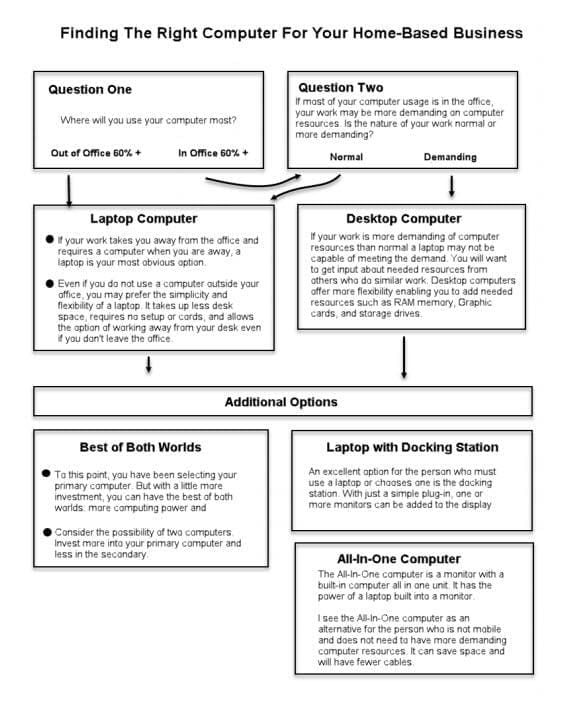https://youtu.be/PfrLdQ6hiH0
Wednesday, June 14, 2023
Streamlining Data Storage for Small Business: From Chaos to Order
https://youtu.be/PfrLdQ6hiH0
Saturday, June 10, 2023
What Type Computer Do You Need for Your Home Business

What Type Computer Is Best For Your Business?
This blog will discuss considerations to help impact your computer choice. I'm not referring to a brand choice, but the type of computer. And in particular, which kind of computer will best suit the needs of the home-based business. Is it a desktop, laptop, or all-in-one computer? In case you are not familiar with the all-in-one computer, it is one in which the monitor and computer are one unit.
I should emphasize that this is not an assessment of the better computer. Such efforts will likely end in a draw. This old debate between desktops and laptops has become pointless. Laptops have improved to the point of being equal to the power of the average desktop computer. So our question is about which computer best meets the needs of your home-based office.
Step One - Computing Location:
Stationary or Mobile - Let's begin with the question, "Where will you be using your computer most of the time?" Will your answer to this question need a stationary or portable computer? Or might it include both?If your answer is 'stationary,' all three options are still in the running. Skip Step Two and proceed to Step Three to consider your computing requirements.
We independently select these products — if you buy from one of our links, we may earn a commission.
Step Two - Computing Location Part 2:
If your answer in Step One was 'mobile,' your next question is, "How much of your work is mobile and how much is in the office?"
- - If one-half or more of your work is in the office, move on to Step Three.
- - If less than one-half of your work is in the office, selecting a laptop may be your best choice. In that case, you can stop here and begin shopping for your laptop computer unless you want to continue.
NOTE: If more than half of your work is away from your office, I assume that your computing requirements are lite. So they will not go beyond the capabilities of a laptop. If I am wrong in this assumption about your work, you will need to continue with Step three.
Step Three - Computing Requirements:
Now our questions change direction. No longer are we talking about the location of your work but of usage? For what functions do you use your computer most often?
Standard processes:
- - Word processing & spreadsheets?
- - Are we accounting with QuickBooks or similar software?
- - Web design?
More demanding processes:
- - Graphic design?
- - Video editing?
- - Photography?
Is more than one-half of your work outside your office? Does your computer usage fall within the standard processes? A laptop computer should be a good fit for you. Regardless of your computer choice, you still want to avoid a low-end computer. You do not want to spend much time watching wheels spin as you wait on your computer. Here are some recommended minimum specifications:
- - At least 8 GB of RAM
- - An Intel Core i5 or equal processor
- - An 802.11ac 2.4/5 GHz wireless network adapter.
Do your regular tasks fall within the more demanding processes? Your computer may need some extra specifications not found in the list above. For instance, if you are an experienced graphic designer, you may already know what you need. But a beginning graphic designer needs input from those experienced in design. I will not try to address the specifications of these specialties. I wish to point out that specific computing tasks may need more specifications. So I recommend that you explore those specifications based on your computing requirements. If you need beefed-up specifications in your computer, your choice may need to be a desktop. A desktop will allow greater flexibility and capacity.
Step Four - Desktop vs Laptop vs All-In-One vs Docking Station:
By this point, we may have left mobile users behind. A laptop is the best and, maybe, the only choice. There is no need to consider anything else.
If the bulk of your work is in the office, all three computers can compete for your choice:
- - In-office & standard usage - If most of your work is in the office, you need not default to a desktop computer. A laptop or all-in-one may be your best choice if your computer usage falls within normal processes.
- - You may prefer the simplicity of the laptop. Set it on the desk, plug it in (or not), and you are ready! The same goes for the all-in-one. The only difference is that the keyboard is not built-in.
- - Or, your desk may be too small to squeeze a monitor and keyboard on it along with everything else. And where will you set the case? This same argument may apply to the all-in-one, or it may not. It will save space compared to a desktop computer but not compared to a laptop.
- - Even if your work is not mobile, you may want to take your work to the patio or elsewhere on occasion. This argument doesn't work well for the all-in-one. It is not hard to move but will not fit on your lap. It will also need a power source which is not true for a laptop.
- - Screen size is a significant advantage for the all-in-one over the laptop. All-in-one computers come with up to 27-inch screens. Of course, this is no advantage over the desktop.
- - Docking Station - A docking station can be an alternative to the all-in-one computer. It is a good solution for someone who prefers a laptop but wants a larger screen. When in the office, connect your laptop to the docking station. The docking station will, in turn, connect the laptop to one or more screens of whatever size you want.
- - In-office & more demanding usage - Does your work stay in the office, and is your computer usage of a more challenging nature? If your work needs fit this description, I am not attempting to address your needs in this blog. The possibilities are too many and diverse.
The Best of Two Worlds:
There is one last consideration in your choice of computer. This consideration has been on your mind throughout this blog if you are like me. Why not have the best of both worlds and choose a desktop AND a laptop? That is my choice. More than one-half of my work is at my desk, and I like a little more power and larger dual screens. So I invest a little more in my desktop and not as much in a laptop. If less than one-half of my work were at the desk, I would invest more in the laptop than the desktop. Using two computers can also be a solution for the person who needs to be mobile while needing a more powerful computer for graphics work.
We independently select these products — if you buy from one of our links, we may earn a commission.
Download Free Infographic
Friday, June 9, 2023
Boost Your WordPress Projects with WPMU DEV - Why Choose Us?
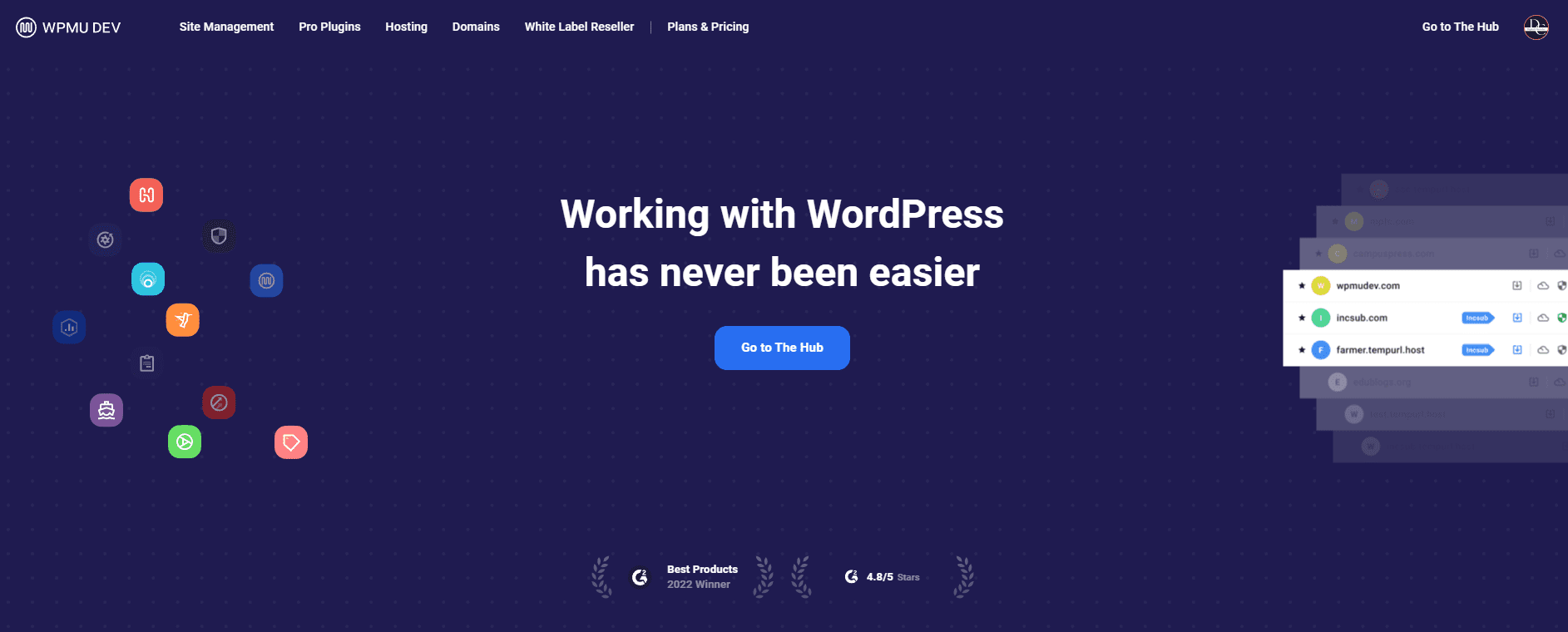
Why might you choose WPMU DEV for Your WordPress Projects? First, let me ask, "What is your approach to using plugins for your WordPress websites?" If you're like me, when I first got acquainted with WordPress, my use of plugins could have been better organized. I'd seek a plugin to fill whatever my current need happened to be. My preference was for free plugins.
In time, I had an array of plugins beginning to have conflicts and JavaScript errors. I was becoming increasingly frustrated with the problems arising and the time it took to find solutions.
One day, while looking for a better solution for image optimization, I came across a recommendation for Smush. Smush is for image optimization. The advice included Hummingbird for site performance. Initially, I saw them as individual plugins, but then I learned they were just two of a covey of plugins that WPMU DEV provides. As was my practice, I began using the free versions. But when I decided to upgrade Smush to the pro version, I learned that by upgrading this one plugin, I had access to the whole line of pro plugins offered by WPMU DEV.
Besides doing blogs for my affiliate website, I also developed WordPress sites for small businesses and organizations. While researching and experimenting with various plugins, I was also looking for a unified package I could offer my clients. Also, I can manage all the sites I host.
I had found that with one company and was on the way to making this my website management system for all my clients. But after I came across WPMU DEV, I changed my mind.
Why I selected WPMU DEV for my Wordpress projects
So, what changed my mind? Well, it was the usual: quality and price. Beginning with quality, I knew Smush and Hummingbird have name recognition for quality products, and I liked what I saw in working with those two plugins. Initially, I assumed they would be out of my price range, at least for what I'm willing to work with. But this was not the case. So when I considered upgrading Smush to the pro version, I learned that for the price of what I was paying for the lowest level backup with the other company, I could have the pro version of every plugin that WPMU DEV offered just for the price of that one plugin.
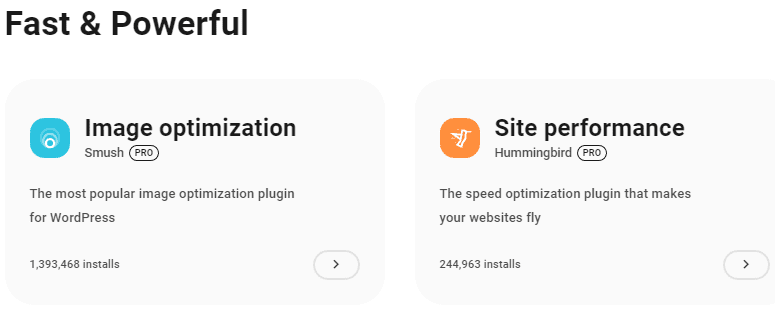
And guess what? There are no conflicts. They all work together. My website runs faster and smoother than it ever has. But this was only the beginning. I considered what I paid for backup, security, contact forms, SEO, and other plugins. When I compared the combined cost of those apps to the one price I was required to pay for all plugins by WPMU DEV, I was blown away.
Furthermore, I considered the cost of multiple websites. I got all the pro plugins for $7.50 a month for my one site. I paid $5 per month for the basic backup with the other company. If I were to add more websites, it would cost me $12.50 a month for three sites. This would allow one license for my site plus two clients. And I would share the cost with those clients. If I were so inclined, I could also add a small surcharge.
This monthly fee for three sites gives access to all pro plugins for all three sites, plus a dashboard. I can monitor each site from the dashboard, check if they are down, update plugins, check analytics and security, and make backups or site recovery. I can also use their tools for client billing and reporting.
If any of this piqued your interest, keep reading. In the remainder of the article, I will give an overview of the various plugin features. Even though I'm an affiliate marketer, I don't receive any benefits if you should sign up with WPMU DEV. I want to help readers find quality services for their websites and small businesses.
WPMU DEV Hub
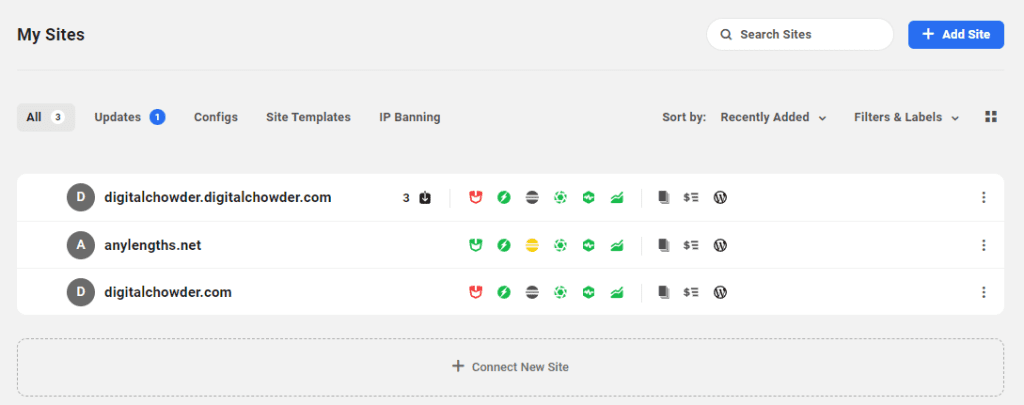
You can see the WPMU DEV "Hub" in the displayed image. I have websites linked to all three of the licenses with my subscription. I get an overview of the activity from the Hub for all three sites. I hover over the corresponding icon to check any feature and get a report. Moving from left to right, I can check the following:
- Available updates- Security- Performance- SEO- Backups- Uptime- Analytics- Reports- Client billing- And link to the client admin panel.WPMU Features
Based on what I see when I glance at the sites listed in the Hub, I may take a closer look. First, I must click on the website I want to explore. This opens a dashboard for that site. This page gives us a more detailed summary of all the features we glanced at on the Hub.
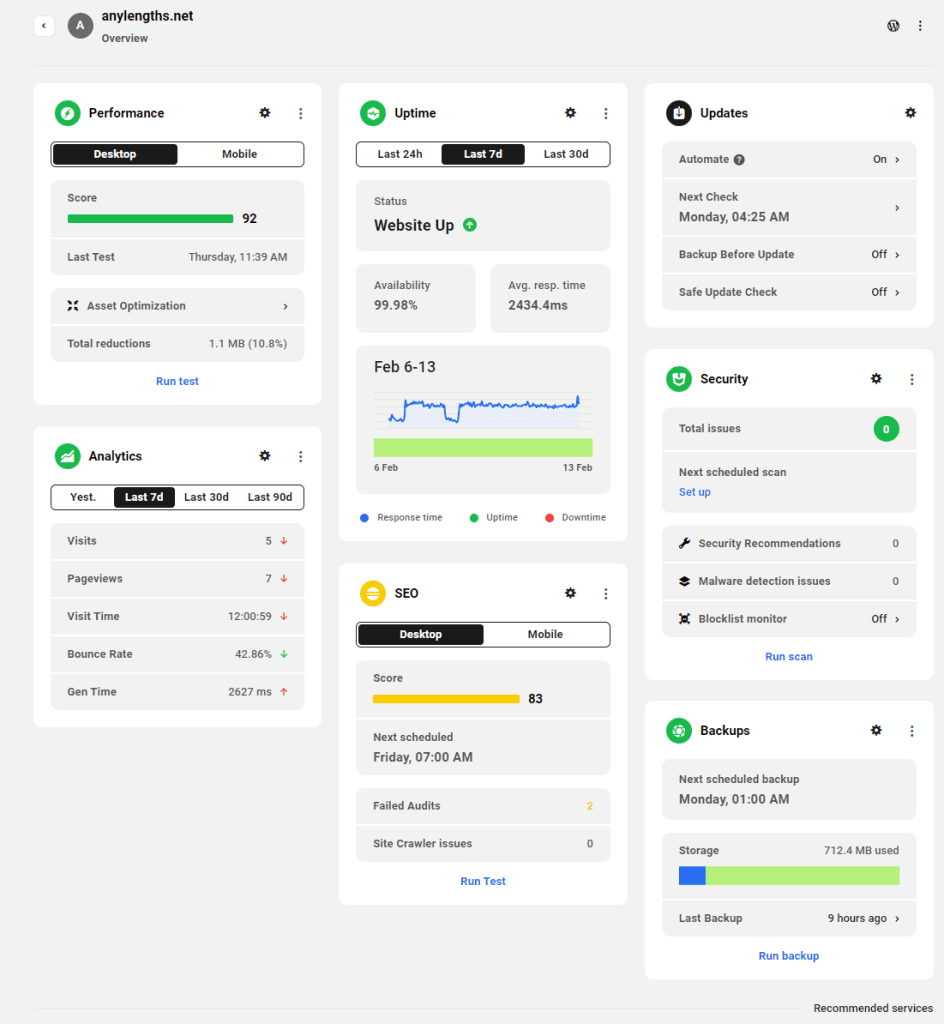
I may not need to go further, depending on what I see here. Even if there are no performance or security issues, I often move on to a detailed page for a feature, so I might check my settings or take a closer look at the data.
For this article, I checked the uptime details for the website I'm reviewing. Because I noticed a few dips in response time over the past week, I selected the detail page for uptime. From this page, I can see the times when the drops took place, and if I choose, I can compare it to other issues that might result from the low response time.
I can also see one downtime during that period of one minute. However, the uptime average for that week was 99.98%. A score that is within the promise of the hosting service and could even correspond to a maintenance episode.
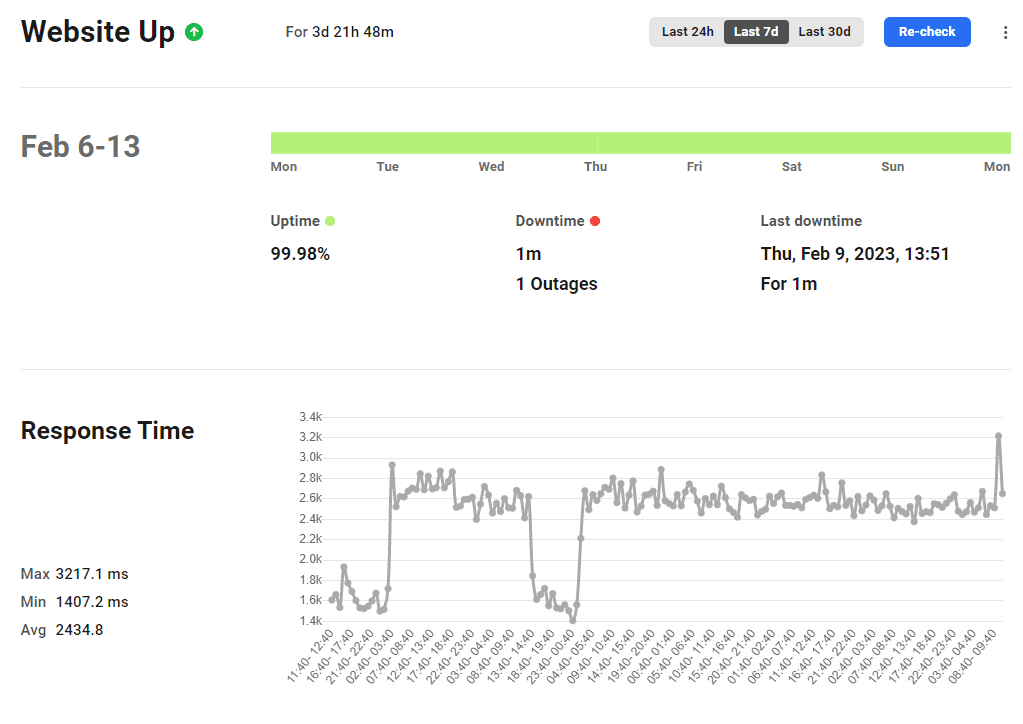
I also noticed on the dashboard page there were two failed audits under SEO. After going to that detail page, I learned that the failures have to do with a missing image alt and an uncrawlable link. So I fix these issues.
While on the SEO detail page, I noticed some other details needing attention, though they were not causing alerts.
These examples show how the WPMU DEV website management helps me monitor and maintain client websites. The examples I used with Uptime and SEO could also be applied to: Plugin updates, Security, Backups, Performance, and Analytics.
WPMU DEV Plugins for WordPress projects
Here is a complete list of WPMU DEV plugins:
Smush Pro - User's choice, award-winning, and benchmark tested – The best image optimizer plugin for WordPress.
Hummingbird Pro - Everything you need to get your site running super fast.
Defender Pro - Regular security scans, vulnerability reports, safety recommendations, and security tweaks for WordPress.
Hustle Pro - Grow your business and audience with this super easy, super slick email opt-in and marketing plugin.
Forminator Pro - Drag and drop WordPress form builder plugin with interactive polls and quizzes for increasing user engagement and building a following.
SmartCrawl Pro - Boost your PageRank and drive more traffic to your site with little effort and simple configuration.
Snapshot Pro - Make and schedule incremental backups of your WordPress websites and store them on secure cloud storage.
Branda Pro - White-label WordPress branding for both the front and back end of your site or network.
WPMU DEV Dashboard - Instant access to brilliant support and one-click plugin and theme installation.
Shipper Pro - Shipper Pro moves WordPress websites with one click, from host to host, local to production, development to live, and top to bottom, without using FTP.
Beehive Pro - Customizable Google Analytics dashboards, statistics, and reports for WordPress and Multisite.Integrated
Video Tutorial - Complete, quality, always up-to-date list of unbranded WordPress training videos.
WPMU DEV Support
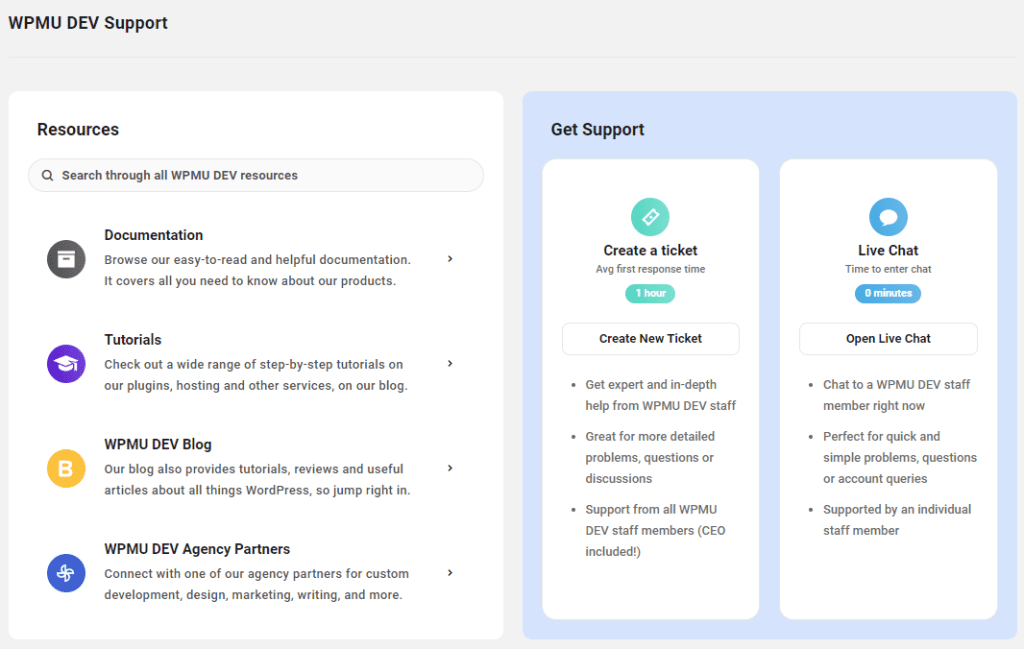
I want to conclude with a comment about WPMU DEV Support. Support is always an important factor, along with the price and the quality, when selecting a product. Before investing heavily in a product, I want to know if I will receive help should I need help with the product.
With WPMU DEV, the answer is a yes. I give it an A+ rating. This is my response to the help I received when setting up the Snapshot plugin for backups. It needed to be fixed with my site.
I began by making contact through chat. The chat agent spent a couple of hours with me seeking the solution. When we were unsuccessful, he elevated the issue to technical support, activating a support ticket before we signed off. It was also necessary for me to give wp-admin and FTP access.
By the next day, the backup was working, but they had also made some changes in the plugin to make it work. Changes will be reflected in the next update. I was asked to create a staging site to allow further debugging so they could find and implement a fix in future releases.
View Video
You can view a video of the article for a more hands-on presentation.
Conclusion
Thank you for joining me in this article about WPMU DEV and its all-in-one monitoring system. If you found it helpful, please leave a comment below. Let me know what you think and the questions you have. I would love for you to share any ideas for future articles.
https://digitalchowder.com/boost-your-wordpress-projects-with-wpmu-dev-why-choose-us/
Thursday, June 8, 2023
What To Look For In A Reliable Internet Connection
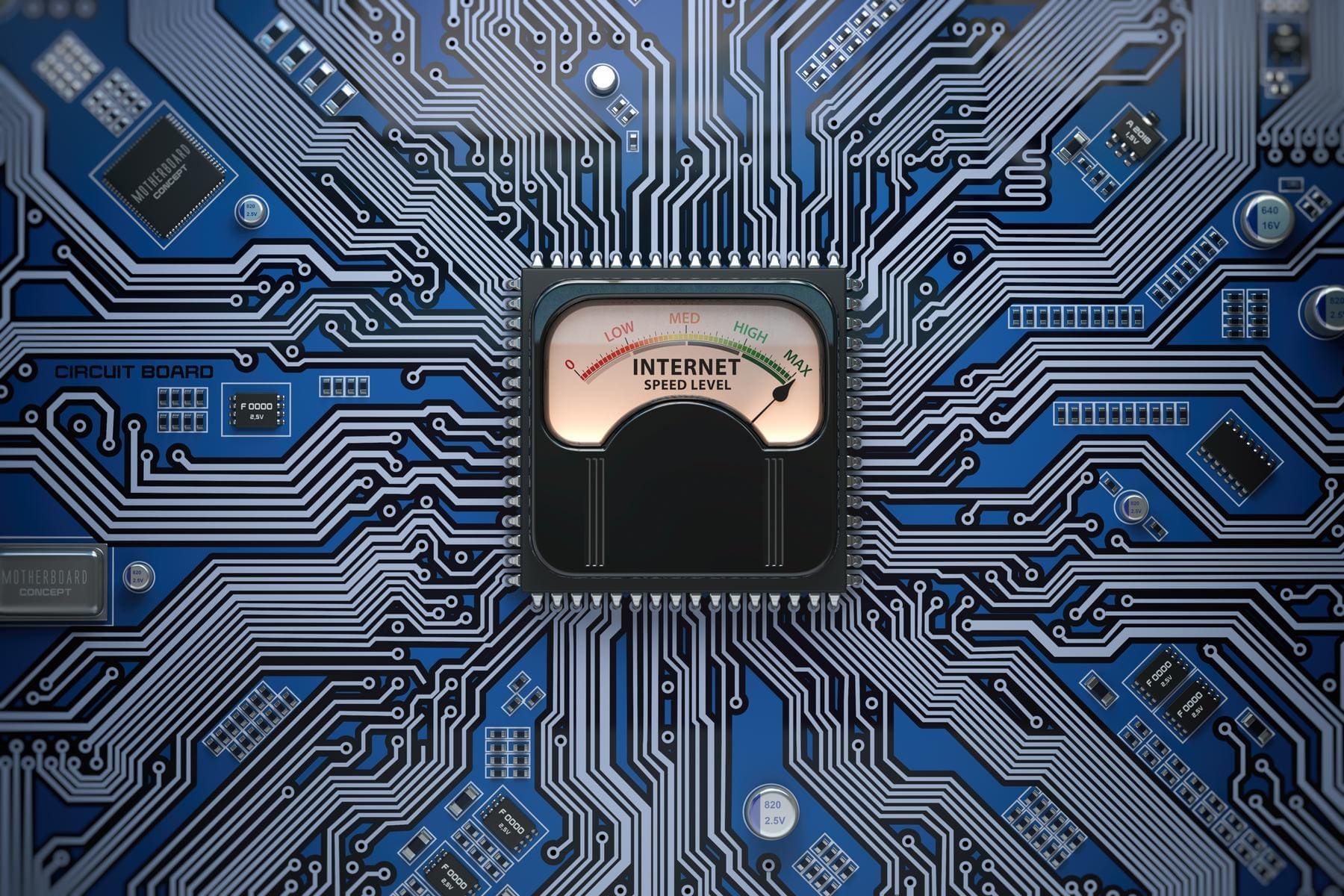
A strong foundation is necessary for your home business's success. And a part of this foundation is your internet connection. Yet, how do you choose a dependable internet connection?
This post will discuss the speed, dependability, and availability of four types of internet connections. We'll then direct you to the best providers for these internet connections.

Connection Types:
1. DSL Connection:Description - DSL, or Digital Subscriber Line, is an internet connection that works from telephone lines. It is a feature of telephone services such as AT&T.
Speed - Speed is the greatest drawback for DSL. With a top speed of 100 Mbps, it comes in last among the four types of internet connections.
Reliability - In general, DSL and cable are equally dependable. But, the service provider will determine how reliable and fast the connection is.
Availability - Availability will be dependent on your location. AT&T, once a primary provider of DSL, has phased it out. But it is still widely available where other providers offer it.
Recommendations - DSL would not be my recommendation for the home business unless it is the only alternative. While it may be a good choice for individual use, it is too slow for the demands of a business.
2. Cable Connection:Description - You get a cable connection from the same service that provides your cable television service. If you already have cable TV, you will only need to add internet service to your plan. If you do not have cable TV, you can order only the internet service from your local cable provider.
Speed - Cable internet can deliver up to 1,000 Mbps. This makes it ten times faster than the maximum speed for DSL.
Reliability - Both cable and DSL are equally reliable.
Availability - when it comes to availability, cable wins over fiber, but fiber is catching up. Depending on your location, you may only have cable as an option. If you choose cable, you may have only one cable provider available for your area.
Recommendations - For business use, I am not recommending DSL. This leaves cable, fiber, or mobile hotspot.
A recommendation is meaningless unless there is a selection. But, you may not have a choice. If you have the option of one or the other, the expense will come next on your list. Fiber might be more expensive by way of comparison. Is it worth paying extra money for faster speeds?
3. Fiber Optic:Description -Fiber optic is a method of sending data signals over long distances with little loss of strength. Both DSL and cable connections use wires that have many points along the route to your modem, which can reduce their strength.
Speed - Fiber can reach top speeds of 10,000 Mbps, making it 10 times faster than cable. As with DSL and cable, the actual speed will depend on your service plan.
Reliability - Fiber optic cabling is more dependable and secure than cable or DSL. This is due to the fact that data is transmitted via light on fiber. The type of cable used in fiber has no signal deterioration issues.
Availability - Availability can be an issue. Even if your location is in a metropolitan area, there is no guarantee that fiber service will have made it to your neighborhood yet.
Recommendations -If there is a suitable alternative, and the price difference isn't huge, fiber is my clear choice. I'm paying $5-10 more per month for twice the speed of cable via AT&T Fiber. For me, this difference is worth the speed increase.
Description - A mobile hotspot is a technology that allows you to use your phone's cellular data connection to establish a Wi-Fi network. This may be useful for home businesses that require a stable internet connection but do not have access to cable or DSL.
You may be able to setup a mobile hotspot using your current phone depending on the plan you have with your provider. Most providers offer a mobile hotspot option that allows you to utilize the internet by connecting your PC to your mobile hotspot. Please note, though, that even if your phone plan has unlimited data, your hotspot allowance will likely have a limited to the amount of data used by the hotspot at full speed. Beyond that limit, it may have unlimited data at a slower speed.
You can also buy a hotspot device to connect to your plan and provide WiFi for multiple device users even when your phone is not present.
An advantage of a mobile hotspot is that you can have an internet connection for your computer anywhere mobile phone service is available.
Other Hotspot Considerations
Speed - The mobile hotspot will have slower internet connections than the connection types. For example, if you're using a phone with 4G support to connect to the hotspot, you'll get maximum speeds of around 25–30 Mbps. Depending on location and signal strength, 5G phones can provide speeds up to 1,000 Mbps. If you can get 5G with 1,000 Mbps, you will be on par with a cable connection.
Reliability - A mobile hotspot will be as dependable as your phone connection. However, if your phone cannot connect, neither will the hotspot. This is somewhat self-evident, but sometimes we can overlook the obvious.
Availability - Mobile hotspot connections will benefit from having more alternatives. Even in locations where cable or fiber isn't available, mobile phones will be accessible. The trick is to get a plan that includes a mobile hotspot with your phone service. Or, you can buy a hotspot device.
Recommendations - Mobile hotspot is becoming more and more a viable option for a home business. While fiber remains the fastest connection, it is possible to have a hotspot equal in speed to cable. As you will find in the next section on providers, cost for hotspots are not out of reason. The biggest factor to consider is the amount of data you will need. You will have limits on data usage and will pay more to get more.
To me, the greatest advantage with a mobile hotspot is flexibility. Depending on your data usage, it is possible to use a hotspot for your office internet connection and also take it on the road with you to use wherever you are.
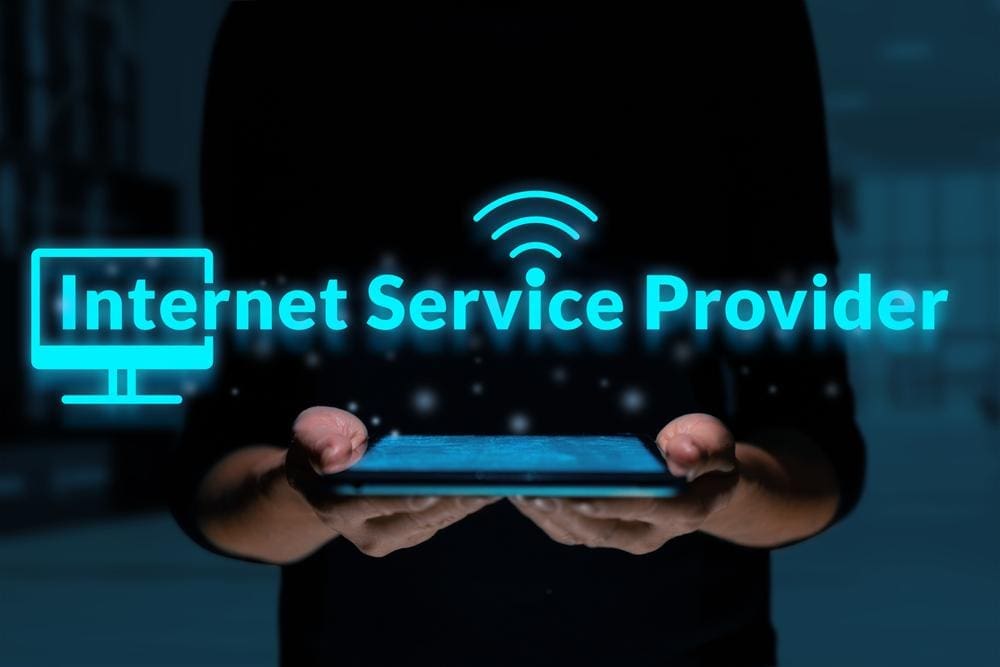
Internet Providers
We're now ready to look at internet service providers. To do so, I'll use data from highspeedinternet.com as a reference point. Drawing on an article titled, "2021's Best Internet Providers in Customer Satisfaction," by Bison Messink. I'll give a brief rundown of key facts from the article. If you want to get down into the gritty details, here is a link you may use:
- https://www.highspeedinternet.com/resources/customer-satisfaction-surveyHigh-speed Internet ReviewHighspeedinternet.com did a survey of 12 internet providers rating them on customer satisfaction in five areas:
- Overall satisfaction- Internet speed- Reliability- Price- Customer ServiceI will list the top three providers in each of these five categories. If none of the top three providers in these categories are available in your area, go to this link to find other providers that ranked well.
Overall satisfaction:
In terms of overall customer satisfaction, the top three internet suppliers are:
Internet speed:
The top three recipients for internet speed customer satisfaction were:
Reliability:
Top customer satisfaction for reliability went to:
Price:
Customer satisfaction for price recipients was:
Customer Service:
Finally, the top three for customer service were:
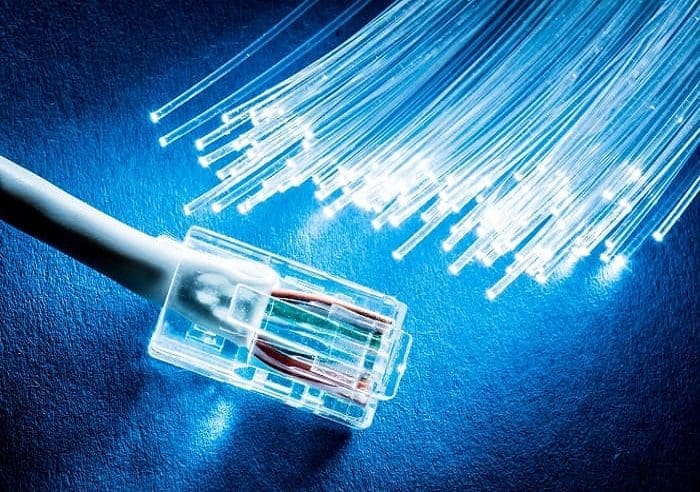
Providers of Cable and Fiber Internet
I will again reference a report from highspeedinternet.com by Rebecca Lee Armstrong and Kevin Parrish, titled, "Fiber vs. Cable Internet: Compare Options and Providers." You can access the report using this link. This information is current as of April 15, 2022.
The Best Cable Internet Providers1. Xfinity
50–1,200 Mbps
$25.00–$79.99/mo.
2. Spectrum
200–1,000 Mbps
$49.99–$89.99/mo. for 12 mo.
3. Cox
25–Up to 1,000 Mbps
$29.99–$109.99/mo.
4. Optimum
100–940 Mbps
$29.99–$49.99/mo.
5. WOW!
100–1,000 Mbps
$19.99–$64.99/mo.
6. Astound Broadband
Up to 50–Up to 940 Mbps
$19.99–$49.99/mo.
1. Google Fiber
1,000–2,000 Mbps
$70.00–$100.00/mo.
2. AT&T
100–5,000 Mbps
$55.00–$180.00/mo.
3. Verizon
300–940 Mbps
$39.99–$89.99/mo.
4. CenturyLink
200–940 Mbps
$65.00/mo.§
5. Frontier
500–2,000 Mbps
$49.99–$149.99/mo.
PC Magazine labels the following hotspot providers as "The Best Mobile Hotspots for 2022." The list below is not their full list, but is the top three. This link will take you to the article.
- T-Mobile Hotspot- Hotspot device - $299.99 (at Amazon)- $50 per month for 100GB- 5G- AT&T Hotspot- Hotspot device - $499.00 (at Amazon)- $50 per month for 40GB- 4G- Verizon 5G Hotspot- $399.99 (at Verizon)- $60 per month for 100GBunlimited lower-speed data- 5GConclusion
It can be intimidating to figure out what the best internet service is for your needs. There are numerous variables to consider, including price, speed, dependability, and customer support. We hope that we have been able to assist you in your search for a trustworthy internet connection!
(We independently select these products — if you buy from one of our links, we may earn a commission.)
https://digitalchowder.com/what-to-look-for-in-a-dependable-internet-connection/
Wednesday, June 7, 2023
What To Consider When Buying A Scanner For The Home Office
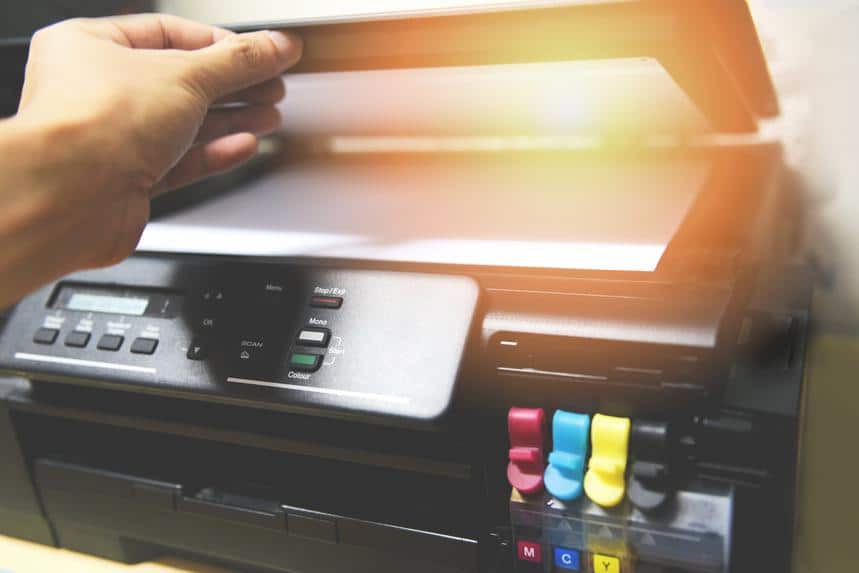
A scanner is an important piece of equipment for any home office. They make it easy to scan documents and photos and are also helpful for creative projects or for keeping track of your finances. If you're in the market for a scanner, you should keep a few things in mind. In this blog post, we will discuss the key features to look for when buying a scanner.
FEATURES TO CONSIDER:
Document TypesSize - The document type is the first step in selecting a scanner. And the first thing to consider regarding document type is size. Will they be a letter or legal size? If so, an A4 printer will be your pick. But if you want to scan larger items, you need an A3 scanner.
Black & White or Color - Another feature that goes back to the document type will be color. Most scanners can scan in either format, color, or black & white. But if color is necessary, you will want to check for sure when selecting a scanner that can process in color.
Resolution - A further feature related to document type is resolution. This is an important consideration if you will be scanning photos and need good-quality scans. A scanner with a DPI of 400-600 will be preferable in this case.
Simplex or Duplex - Duplexing is a feature that allows scanning both sides of a document in one procedure. The main question about duplexing is whether you will work with two-sided documents. Only feeder scanners can duplexing, so if you need duplexing, you will also need a feeder. This is not a problem unless you need to scan bound documents.

Scan Features
- - Scanning Volume - Next, you want to consider how much scanning you'll be doing. The following two features are particularly significant for higher-volume scanning:
- - Feeder or Flatbed - A feeder scanner, which feeds the pages you are scanning, can be helpful if you do a lot of scanning or if your scanning involves multiple-page papers. A feeder is distinct from a flatbed scanner because it can automatically feed pages for scanning. A feeder also gives you the choice of duplex scanning. Unfortunately, you will need a flatbed scanner if the multiple-page documents you need to scan are bound, such as with a book.
- - Speed - The speed of a scanner is crucial if you will be doing a lot of scanning. You measure speed in pages per minute (ppm). Normal scanner speeds range from 20 ppm to 200 ppm. The lower ranges will be enough for the average home office. If you are doing a high volume of scans, you will need a higher ppm scanner.
- - Software -A final consideration when choosing a scanner is the driver or software that comes with it. The terms driver and software are interchangeable. They make the scanner work. The software creates the documents that come from the scans. You will want to check and see what types of documents the software can make. The default document output that most scanners produce is a PDF. But you may need to create DOCX or RTF documents with your scanner. And if you are scanning photos, you will need TIFF, JPEG, or similar file types.
ADDITIONAL CONSIDERATIONS:
If you have worked through the previous section, you are almost ready to select a scanner. But here are a few more technical considerations:
All-In-OneAn all-in-one machine can do three or four things. It can print, scan, and copy. Sometimes it can also fax. The all-in-one is a good choice for your home office. Instead of three or four pieces of equipment, only one takes up office space. If you are considering an all-in-one, my blog "How to choose the right printer for your home business: A Guide" will be a good read. This is a partner blog to this one, helping you to make a good choice with both printer and scanner.
Specialized Scanners and AccessoriesA final consideration is whether you need a specialized scanner. This will be the case if you need:
- - Large format/high precision scanning
- - Specialized book scanning
- - Mobile scanning
- - Networked scanning
- - Check scanners /MICR readersHigh Capacity
This would be a higher capacity than what we discussed above about volume. I mention these specialized requirements to call attention to the need to check scanner capabilities. You want to ensure the scanner you choose can meet your needs in these areas. I won't detail these needs in this blog, but you should know them.
CompatibilityYou will want to ensure that the scanner you choose is compatible with the other equipment in your office. For example, is it compatible with your operating system? Does it need more processing or memory than what your computer has? Although there is usually no conflict, it is a good idea not to take compatibility for granted.
SELECTING THE SCANNER:
(We independently select these products — if you buy from one of our links, we may earn a commission.)
Now that you have all the selection details, it is time to look at some scanners. Here are a few possibilities for you in four different categories.
Flatbed ScannersFeeder & Duplex ScannersHigh Capacity ScannersAll-In-One Printer/Scanner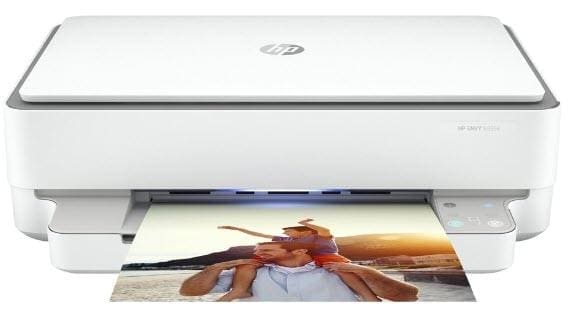 Check At Amazon
Check At Amazon(We independently select these products — if you buy from one of our links, we may earn a commission.)
Conclusion:
Choosing the best scanner for your home office can be a daunting task. There are many factors to consider, such as how much scanning you'll be doing, the type of documents you need to create, and compatibility with other devices. But with these considerations in mind, you will find the perfect scanner for your needs.
https://digitalchowder.com/what-to-consider-when-buying-a-scanner-for-the-home-office/
Tuesday, June 6, 2023
How to Choose The Right Printer For Your Home Business

If you have a home business, then you know that having a reliable printer are both essential tools. But with all the different options on the market, it can be tough to decide which one is right for your business. In this blog post, we'll give you some tips on how to choose the right printer for your business. Tips on choosing the right scanner we will address in a later blog.
There are a few things to keep in mind when choosing the right printer for your business. The type of business you have will dictate the type of printer you need.
Considerations- - The volume of printing you need to do: If you only need to print on occasion, you can get away with a less expensive printer. Yet, if you do a lot of printing, you will need a more robust printer that can handle the volume. 20 ppm for moderate print output will work for most home office settings. If your printing is heavier than that, 30-40 ppm may be necessary. Over 40 ppm is getting into heavy-duty usage and under 20 ppm will be rather slow.
- - The type of documents you need to print: If you only need to print simple documents, you can get away with a basic printer. But, if you need to print more complex documents, you will need a more advanced printer.
- - Simple - Letter size, single-sided, black & white
- - Complex - Legal or Ledger size, double-sided, color
- - Special - Banner or poster
- - The quality of the prints: A third consideration is the quality of printing you will be doing. Will it be high-quality documents or photos? When we turn to quality in printing the focus is on DPI, or dots per inch. The higher the number of dots per inch, the higher the quality of printing. As a general rule this guide you can follow this guide:
- - For a letter or business document with graphics, 300 dpi will look fine.
- - A higher-quality document such as a handout for the board of directors will call for 600 dpi.
- - For the average photographer, 1200 dpi is excellent for photos.Type of Printer

Inkjet Printer
An inkjet printer will meet all the requirements above, but not at a commercial volume. Inkjets create a clean, sharp image that is suitable for both high-quality paperwork and photo printing. When it comes to big-volume production, but, it falls short. It is slower than laser printers and more expensive to run. They only print about 220 pages for each standard ink cartridge. This can add up to considerable expense. Though inkjet printers have a lower purchase price than laser printers, they close the gap with the cost of ink with a higher printing volume.
(We independently select these products — if you buy from one of our links, we may earn a commission.)

A laser printer may meet both the higher volume printing and high-quality printing needs. You'll pay a higher upfront cost for a laser printer, but the lower cost of printing will make up for it. A regular high yield ink cartridge that costs $41 will print 600 pages on average. Yet, a high yield laser print cartridge that costs $45 will print about 1,800 pages. This is $.07 per page for the inkjet compared to $.025 per page for the laser.What about the cost of the printer? You can buy a low-end inkjet color printer for less than $100. Compare this to a low-end laser black & white printer for about $120. A color laser printer will start at around $180. In either case, you can have a wireless printer for these prices.With either an inkjet or laser printer, you don't have to pay more to get better print quality. Most of the time, you'll get more features (like automatic duplexing) if you pay more, with no change in print quality. An example of this is the HP DeskJet 4155e, with a purchase price of $124.99 on Amazon. The print quality for this printer, or DPI, is 1200 X 1200. You will pay $100 more for a printer such as the HP Envy Inspire 7955e, to get a DPI of 4800 x 1200. The price is $219.89.
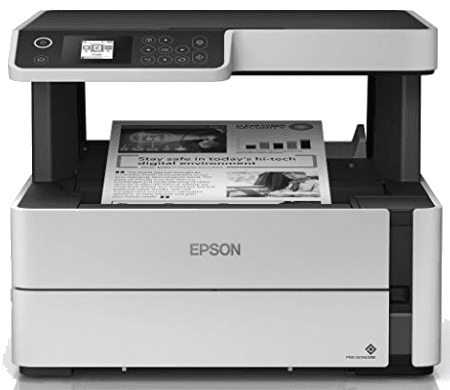
Supertank printers are inkjet printers with a tube system instead of individual ink cartridges. The printers drawn ink through tubes from high-capacity ink tanks. These tanks are filled from high-capacity ink bottles. Replacement ink bottles include enough ink to print thousands of pages and cost under $20.Cost of SuperTank printers start at around $190.
(We independently select these products — if you buy from one of our links, we may earn a commission.)
ConclusionTo summarize, the best printer for a business depends on:
- The nature of printing- The quantity of printing- The budgetAn inkjet printer is an excellent choice for high-quality documents and photographs. A laser printer is a better option when producing larger quantities of material. But the SuperTank printers can step up to the task of volume printing as it brings down the cost per page.
https://digitalchowder.com/how-to-choose-the-right-printer-for-your-home-business-a-guide/
Monday, June 5, 2023
Streamlining Data Storage for Small Business: From Chaos to Order
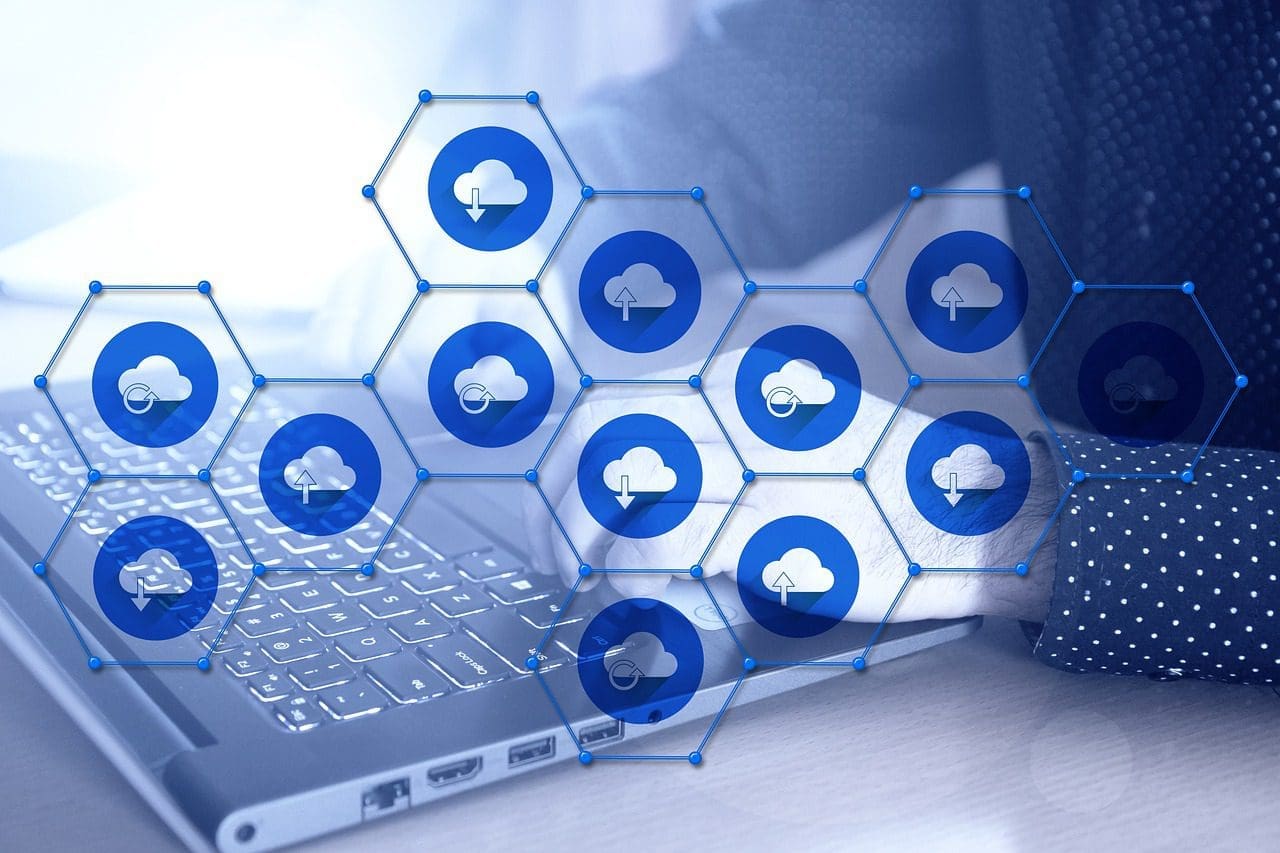
As a small business owner, you know that managing your data is one of the biggest challenges you face. With so much information coming in from different sources, it can be overwhelming to keep track of everything. And when you add in the need to store and access data securely, the task can quickly become daunting.
But fear not; there is a solution! By streamlining your data storage, you can turn chaos into organization and gain control over your data. In this article, we'll explore the benefits of a streamlined data storage system and provide some practical tips on implementing one for your small business.
Whether you're just starting out or have been in business for years, these tips will help you keep your data safe and organized, so you can focus on what really matters - growing your business. So let's get started!
The Importance of Data Organization
Data is at the heart of every business. Data drives decisions and helps businesses grow from customer information to financial records. However, data can quickly become overwhelming if it's not organized correctly. Without a streamlined data storage system, you risk losing important information or compromising your data's security. That's why it's essential to have a plan for organizing and managing your data.
Having a well-organized data storage system can provide several benefits for your business. First and foremost, it can help you save time. With a streamlined system, you can quickly and easily find the needed data, without wasting time searching through files or folders. This can help you be more productive and efficient, allowing you to focus on other essential tasks.
In addition to saving time, having a well-organized data storage system can also improve the accuracy of your data. When data is scattered across different systems and platforms, it's easy for errors to occur. By consolidating your data into a single system, you can reduce the risk of errors and ensure that your data is accurate and up-to-date.
Common Challenges of Data Storage for Small Businesses
While having a well-organized data storage system is essential, achieving it's not always easy. Small businesses often face several challenges when it comes to managing their data. One of the biggest challenges is simply keeping up with the volume of data that is generated daily.
As your business grows, so does the amount of data you generate. This can make it challenging to keep track of everything and ensure your data is organized and secure. In addition, small businesses often have limited resources, making investing in the tools and systems needed to manage their data effectively challenging.
Another common challenge of data storage for small businesses is balancing accessibility with security. On the one hand, you need to be able to access your data quickly and efficiently to make informed decisions. On the other hand, you need to ensure that your data is protected from unauthorized access or data breaches. Finding the right balance between accessibility and security can be challenging, but it's essential for the health and success of your business.
Evaluating Your Current Data Storage System
Before you can streamline your data storage system, evaluating your current system and identifying areas that need improvement is essential. Start by taking an inventory of all the data you currently have. This includes digital and physical data, such as paper files or hard drives.
Review your current data storage system once you have a complete data inventory. Is it easy to access and navigate? Are there any redundancies or inefficiencies? Is your data secure? These are just a few questions you should ask yourself as you evaluate your current system.
As you identify areas for improvement, start thinking about how to streamline your data storage system. This may involve consolidating your data into a single system, investing in cloud storage solutions, or implementing new security measures. The key is to find a system that works for your business and helps you stay organized and secure.
Streamlining Your Data Storage with Cloud Solutions
Investing in cloud solutions is one of the most effective ways to streamline your data storage system. Cloud storage allows you to store your data on remote servers, accessed from anywhere with an internet connection. This can provide several benefits for your business, including improved accessibility, scalability, and security.
With cloud storage, you can access your data from anywhere, at any time. This can be especially helpful if you have employees who work remotely or need to access data while on the go. In addition, cloud storage solutions are highly scalable, which means you can easily expand your storage capacity as your business grows.
Perhaps most importantly, cloud storage solutions are highly secure. Cloud providers use advanced security measures, such as encryption and multi-factor authentication, to protect your data from unauthorized access or data breaches. This can provide peace of mind and help ensure your data is safe and secure.
Another factor that has motivated my use of cloud storage is the physical security of my data. By this, I mean that my data is not at risk of natural disasters such as floods or fires that might threaten storage equipment when using physical storage solutions. Plus, I am not at risk of equipment failure, such as a crashed hard drive. Nor do I need to update my equipment periodically to ensure such failures do not occur.
Choosing the Right Cloud Storage Provider
When it comes to choosing a cloud storage provider, there are several factors to consider. First and foremost, you want to choose a provider that offers the features and capabilities you need. This may include things like automatic backups, file sharing, and collaboration tools.
I am also interested in the syncing method between cloud storage and my computer. Is it real-time or scheduled synchronization? While I prefer the real-time approach, my main concern is that the method be automatic. I don't want to have to think about updating files.
In addition to features, you also want to consider the security and reliability of the provider. Look for providers that offer robust security measures, such as encryption and multi-factor authentication. You also want to choose a provider that has a strong track record of reliability, with minimal downtime or service interruptions.
Finally, consider the cost of the provider. While cloud storage solutions can be very cost-effective, you want to ensure you get good value for your money. Look for providers that offer competitive pricing and flexible pricing plans that can grow with your business.
Best Practices for Organizing Data in the Cloud
Once you've chosen a cloud storage provider, following the best practices for organizing your data is essential. This will help you ensure your data is easy to find, accurate, and secure. Here are a few tips to get you started:
1. Use a consistent naming convention for files and folders. This will make it easy to find specific files or folders, even if they're located in different parts of your storage system.
2. Create a clear folder structure. Organize your files into folders based on categories or projects. This will make it easy to find the files you need, without searching through many files.
3. Use tags and labels. Many cloud storage providers allow you to add tags or labels to your files. This can make finding files easily based on keywords or other criteria.
4. Regularly clean up your data. Delete files that are no longer needed and archive older files that are still important but not frequently accessed.
Data Security Considerations
While cloud storage solutions are generally very secure, it's still important to take steps to protect your data. This includes implementing strong passwords, using multi-factor authentication, and limiting access to sensitive data.
In addition, it's essential to regularly monitor your data storage system for any signs of suspicious activity. This may include unusual login attempts or changes to your files or folders. By staying vigilant and taking proactive steps to protect your data, you can minimize the risk of a data breach and ensure the security of your business.
Monitoring and Maintaining Your Data Storage System
Finally, monitoring and maintaining your data storage system regularly is crucial. This includes checking for updates and patches, monitoring system performance, and backing up your data regularly.
Regular maintenance can help ensure that your data storage system is running smoothly and your data is secure. It can also help you identify and address any issues before they become significant problems.

Cloud Storage Recommendation
iDrive cloud backup service is a secure and reliable way to store critical data. All your data is encrypted, so you can rest assured that it remains safe. Its intuitive user interface makes it easy to use, allowing for easy setup and quick access to your files from any device connected to the web. By linking your devices with iDrive, your files and folders will be synchronized in real-time across all the devices without impacting your backup storage. You can also set up automatic backup schedules to ensure all your devices are backed up regularly. With iDrive, you will never worry about losing important data again.
Conclusion
Managing your data can be daunting, but with the right tools and systems in place, it doesn't have to be. By streamlining your data storage system and following best practices for organization and security, you can turn chaos into organization and gain control over your data. Whether you're just starting out or have been in business for years, these tips can help you keep your data safe and organized, so you can focus on what really matters - growing your business.
https://digitalchowder.com/streamlining-data-storage-for-small-business-from-chaos-to-order/
10 Smart E-Commerce strategies to Increase Your E-Commerce Sales
Increase Your E-Commerce Sales If you need help to increase your e-commerce sales despite putting in much effort, you're not alone. With...
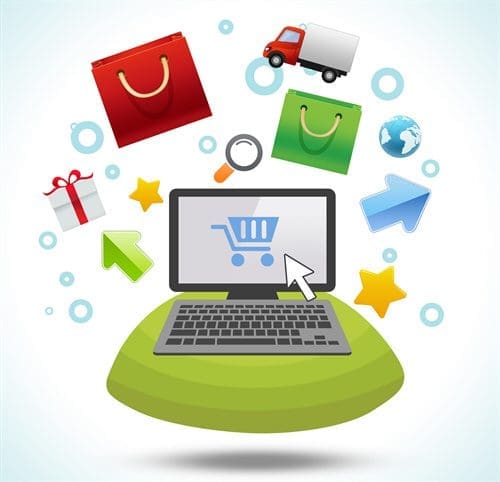
-
In this article, I will highlight Snagit Capture and Screen Recording features. Snagit is a powerful screen capture and recording software t...
-
My Personal Guide to All the Best Features in Nicepage - Part 3 This is my third article in a four-part series about my favorite web builder...
-
NOTE: This article, copied from Website Planet , and writer Bethenny Carl, is an excellent resource for freelancers. I offer it to my reade...


